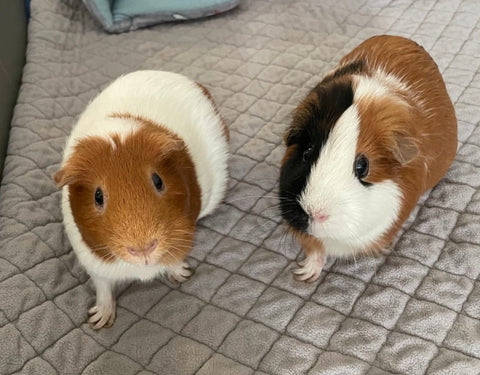How Much Does a Guinea Pig Cost?
Guinea pigs are popular pets known for their friendly nature and adorable appearance. However, potential owners often wonder about the costs associated with bringing a guinea pig into their home. This article will provide a comprehensive overview of the costs involved in owning a guinea pig, including initial purchase or adoption fees, ongoing expenses, and additional considerations. We will also include a FAQ section to address common questions related to guinea pig ownership.
Initial Costs of Owning a Guinea Pig
Purchase or Adoption Fees
The first expense to consider when acquiring a guinea pig is the initial cost of purchasing or adopting one. Prices can vary based on the source:
- Adoption Fees: Typically range from $10 to $50. Many animal shelters and rescue organizations charge a fee to help cover the costs of care and medical treatment for the animals.
- Purchase Fees: If you choose to buy from a breeder or pet store, the cost can range from $20 to $100 for a standard guinea pig. Purebred or show-quality guinea pigs may cost more, sometimes exceeding $100.
Table of Initial Costs
| Cost Type | Price Range |
|---|---|
| Adoption Fee | $10 – $50 |
| Purchase Fee | $20 – $100 |
| Purebred/Show Quality | Up to $100 |
Ongoing Costs of Guinea Pig Care
Once you have acquired a guinea pig, there are several ongoing costs to consider. These include housing, food, bedding, veterinary care, and other supplies.
Housing and Cage
Guinea pigs require a spacious cage to live in. The size of the cage is crucial for their well-being, as they need space to move around and exercise.
- Cage Costs: A suitable guinea pig cage can range from $50 to $200, depending on the size and quality.
- Bedding: Bedding materials, such as wood shavings or fleece liners, are necessary for comfort and hygiene. Expect to spend around $10 to $20 per month on bedding.
Food and Nutrition
A proper diet is essential for guinea pigs, which includes hay, pellets, and fresh vegetables.
- Hay: Guinea pigs should have unlimited access to hay, which is crucial for their digestion. The cost of hay can vary, but you can expect to spend about $10 to $20 per month.
- Pellets: High-quality guinea pig pellets are also necessary, costing around $5 to $15 per month.
- Fresh Vegetables: Fresh vegetables should be included in their diet daily. This can add an additional $10 to $15 per month.
Veterinary Care
Regular veterinary check-ups are important for maintaining your guinea pig’s health.
- Annual Vet Visits: Expect to pay between $50 to $100 for routine check-ups.
- Emergency Care: Be prepared for unexpected health issues, which can be costly. Emergency vet visits can range from $100 to $500 or more, depending on the severity of the issue.
Toys and Enrichment
Guinea pigs are social animals that require mental stimulation.
- Toys: Providing toys and chew items is important for their well-being. Budget around $5 to $20 per month for toys and enrichment supplies.
Additional Supplies
Other supplies may include grooming tools, food bowls, water bottles, and cleaning supplies.
- Initial Setup Costs: For initial setup, including cages, bedding, and supplies, you can expect to spend around $150 to $300.
- Ongoing Supplies: Monthly costs for ongoing supplies can range from $20 to $50.
Summary Table of Ongoing Costs
| Expense Type | Monthly Cost Range |
|---|---|
| Bedding | $10 – $20 |
| Hay | $10 – $20 |
| Pellets | $5 – $15 |
| Fresh Vegetables | $10 – $15 |
| Toys | $5 – $20 |
| Veterinary Care | $50 – $100 (annual) |
| Emergency Care | $100 – $500 (as needed) |
Long-Term Costs and Considerations
Guinea pigs have a lifespan of about 5 to 7 years, and as they age, they may require more frequent veterinary visits and potentially costly medical treatments. Here are some long-term considerations:
Ongoing Medical Expenses
As guinea pigs age, they may develop health issues that require veterinary attention. It’s important to budget for these potential costs.
- Routine Care: Older guinea pigs may require more frequent check-ups, which can increase annual costs.
- Health Issues: Be prepared for unexpected health problems that may arise, such as dental issues or bladder stones, which can lead to significant veterinary bills.
Pet Insurance
Considering pet insurance can be a wise choice for guinea pig owners.
- Insurance Costs: Monthly premiums can range from $10 to $30, depending on the coverage. This can help offset unexpected veterinary expenses.
Emergency Fund
Setting aside an emergency fund specifically for pet care can provide peace of mind.
- Savings Goal: Aim to save at least $500 to $1,000 for unexpected veterinary costs.
Total Cost of Owning a Guinea Pig
When calculating the total cost of owning a guinea pig, consider both initial and ongoing expenses. Here’s a breakdown:
Initial Costs
- Adoption/Purchase: $10 – $100
- Cage: $50 – $200
- Initial Supplies: $150 – $300
Total Initial Cost: Approximately $210 to $600.
Ongoing Monthly Costs
- Bedding: $10 – $20
- Hay: $10 – $20
- Pellets: $5 – $15
- Fresh Vegetables: $10 – $15
- Toys: $5 – $20
Total Monthly Cost: Approximately $40 to $100.
Annual Costs
- Veterinary Care: $50 – $100 (routine)
- Emergency Fund: $100 – $500 (as needed)
Total Annual Cost: Approximately $150 to $600.
Summary Table of Total Costs
| Cost Type | Initial Cost Range | Monthly Cost Range | Annual Cost Range |
|---|---|---|---|
| Adoption/Purchase | $10 – $100 | – | – |
| Cage | $50 – $200 | – | – |
| Initial Supplies | $150 – $300 | – | – |
| Bedding | – | $10 – $20 | $120 – $240 |
| Hay | – | $10 – $20 | $120 – $240 |
| Pellets | – | $5 – $15 | $60 – $180 |
| Fresh Vegetables | – | $10 – $15 | $120 – $180 |
| Toys | – | $5 – $20 | $60 – $240 |
| Veterinary Care | – | – | $50 – $100 |
| Emergency Fund | – | – | $100 – $500 |
FAQ Section
- How much does a guinea pig cost?
- The initial cost ranges from $10 to $100 for adoption or purchase, while ongoing monthly costs can range from $40 to $100.
- What are the ongoing costs of owning a guinea pig?
- Ongoing costs include bedding, hay, pellets, fresh vegetables, toys, and veterinary care, totaling approximately $40 to $100 per month.
- Is it better to adopt or buy a guinea pig?
- Adoption is often less expensive and helps provide a home for animals in need. Adoption fees typically range from $10 to $50.
- What is the lifespan of a guinea pig?
- Guinea pigs typically live for 5 to 7 years.
- Do guinea pigs need a companion?
- Yes, guinea pigs are social animals and thrive in pairs. It is recommended to get at least two guinea pigs to prevent loneliness.
- What should I feed my guinea pig?
- A balanced diet includes unlimited hay, high-quality pellets, and fresh vegetables.
- How often do guinea pigs need veterinary care?
- Routine check-ups are recommended annually, but be prepared for additional visits if health issues arise.
- What are common health issues in guinea pigs?
- Common health issues include dental problems, respiratory infections, and bladder stones.
- Can I save money on guinea pig care?
- You can save money by adopting, making DIY toys, and purchasing supplies in bulk.
- Where can I find more information about guinea pig care?
- For more detailed information, you can visit the Wikipedia page on Guinea pigs.
Conclusion
Owning a guinea pig can be a rewarding experience, but it is essential to understand the associated costs. From initial adoption or purchase fees to ongoing monthly expenses, budgeting for a guinea pig requires careful planning. By considering the costs outlined in this article, potential owners can make informed decisions and ensure they provide a loving and healthy environment for their new furry friends.



